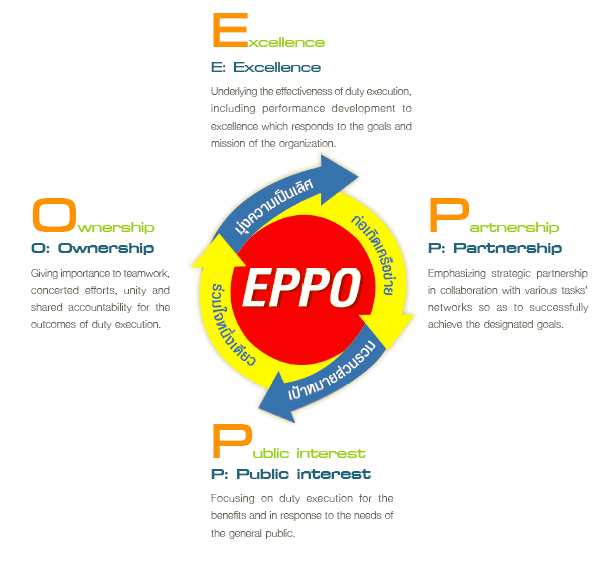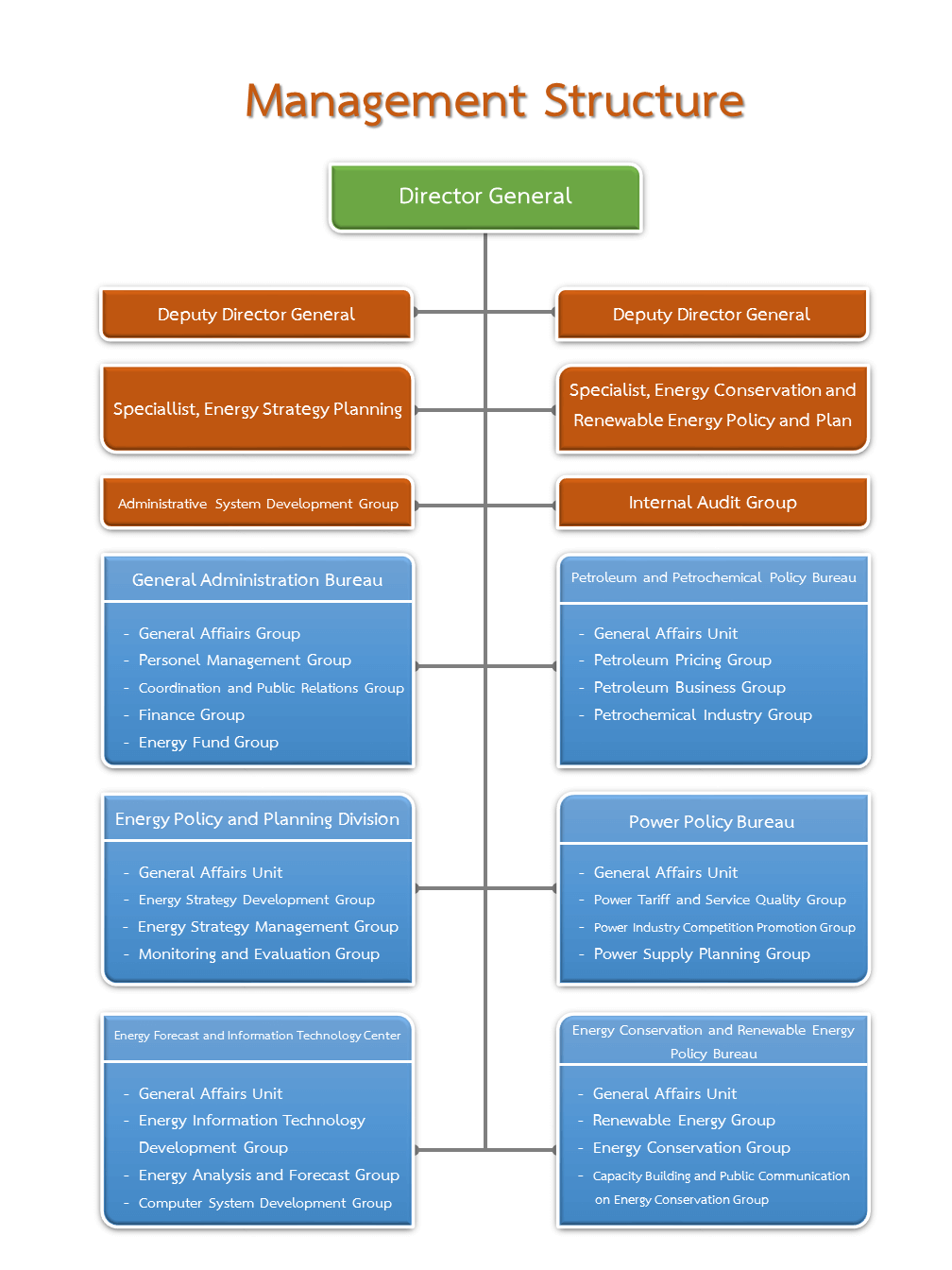Vision Mission Value Duty
Vision
The Energy Policy and Planning Office (EPPO) is a pivotal agency in the formulation and administration of energy policies and planning for the national sustainability
Mission
EPPO is entrusted with the following six missions:
1. Recommend energy policies and integrate/review energy management plans of the country;
2. Recommend national strategies for energy conservation and alternative energy promotion;
3. Recommend measures to solve and prevent oil shortage in both short and long terms;
4. Supervise, monitor and evaluate the implementation of national energy policies and energy management plans;
5. Administer the Information and Communications Technology (ICT) with regard to energy matters of the country; and
6. Enhance EPPO to become a strategic organization.
Strategic Issues
To pursue the foregoing Vision and Mission, fie strategies are laid down:
• Strategy 1 Formulate energy policies and administer energy planning of the country;
• Strategy 2 Promote and develop alternative energy and clean energy;
• Strategy 3 Promote and develop energy conservation and efficient use of energy in all social segments;
• Strategy 4 Develop the national energy information and communications technology (ICT); and
• Strategy 5 Strengthen EPPO to become an organization of excellence in energy administration.
Core Vallues
EPPO has established the following organizational core values and culture with a view to setting a benchmark for duty execution and creating the unity among its personnel, which is unique to the office, for government officials and other staff members to continually adhere to as guidelines on their duty execution and to effectively translate them into practical actions so as to foster and sustain the organizational culture of high quality performance.
CompanyProfile
EPPO Company Profile
Introduction
The Energy Policy and Planning Office (EPPO) is responsible for recommending national energy policies and plans, inclucling energy-related measures and energy conservation to ensure well-proportioned, adequate and efficient supply of energy which corresponds with the situation of the country.
The Energy Policy and Planning Office
Develop Thailand Energy Sector to Attain International Recognition.
History of the Foundation of EPPO
Due to the global energy crises during 1973-1975 And again during 1979-1980, the world economy had to Face problems of high inflation and high unemployment, resulting in a persistent and worldwide economic slowdown for several years. Thailand was then inevitably affected by the global situations; moreover, there was a lack of unity among a number of agencies dealing with energy matters, making it difficult to control and monitor the work execution, which led to discontinuity and ineffectiveness of energy policy formulation and administration.
1986
Due to the aforementioned crises, the Government under Prime Minister General Prem Tinasulanonda had given top priority to the consideration of the improvement of energy policy management system to be more unified and presented the recommended approach to the Council of Economic Ministers on 8 September 1986, i.e. to establish the National Energy Policy Council (NEPC), together with the National Energy Policy Office (NEPO) established under the Office of the Secretariat of the Prime Minister to serve as Secretariat To the NEPC, to be in charge of the formulation of Energy policies and measures. Subsequently, Prime Minister General Prem Tinasulanonda signed the office Of the Prime Minister’s Regulation on the National Energy Administration, B.E. 2529 (1986), leading to the Appointment of the National Energy Policy Council on 16 October 1986.
1989
Later, the cabinet Under Prime Minister General Chatichai Choonhavan passed A resolution on 6 June 1989, Concurring with the NEPC Resolution to upgrade the Status of NEPO to that of a Permanent department under the Office of the Prime Minister to serve as Secretariat to the NEPC.
After the appointment of a new administration under the leadership of Prime Minister Anand Panyarachun, the following legislation were enacted: the National Energy Policy Council Act, B.E. 2535 (1992); the Act on Transfer of Part of Functions and Administrative Work of the Secretariat of the Prime Minister and of the Office of the National Economic and Social Development Board, Office of the Prime Minister, to the National Energy Policy Office, Office of the Prime Minister, B.E. 2535 (1992); the State Administration Act (No.3), B.E. 2536 (1993); the Act on Organization of Ministries, Sub-Ministries and Departments (No.9), B.E. 2536 (1993); and other related pieces of legislation to upgrade the status of NEPO to that of a permanent department under the Office of the Prime Minister, reporting directly to the Prime Minister.
1992
Later on, under the administration of Prime Minister Pol. Lt. Col. Thaksin Shinawatra, the government had a policy to reform the bureaucracy of the country with a view to improving efficiency of work execution of government agencies, by dissolving dispensable agencies so as to reduce overlapping or duplicate operational procedures and establishing several new agencies to take charge of new tasks and duties which were clearer defined. To achieve this, the State Administration Act (No.5), Act (No.5), B.E. 2545 (2002), and the Act on Organization of Ministries, Sub-Ministries and Departments, B.E. 2545 (2002), were enacted. As a result, the Ministry of Energy was then established To supervise and administer energy-related matters of the country, and the National Energy Policy Office (NEPO) was transferred from the Office of the Prime Minister to be Under the Ministry of Energy and has been renamed the Energy Policy and planning Office, or EPPO, since then.
กบง. ครั้งที่ 18 - วันพฤหัสบดีที่ 10 มีนาคม พ.ศ. 2559

มติการประชุมคณะกรรมการบริหารนโยบายพลังงาน
ครั้งที่ 6/2559 (ครั้งที่18)
เมื่อวันพฤหัสบดีที่ 10 มีนาคม พ.ศ. 2559 เวลา13.30น.
1. แนวทางการแก้ไขปัญหาโรงไฟฟ้าชีวมวล
รัฐมนตรีว่าการกระทรวงพลังงาน พลเอกอนันตพร กาญจนรัตน์ เป็นประธานกรรมการ
ผู้อำนวยการสำนักงานนโยบายและแผนพลังงาน นายทวารัฐ สูตะบุตร เป็นกรรมการและเลขานุการ
เรื่อง แนวทางการแก้ไขปัญหาโรงไฟฟ้าชีวมวล
สรุปสาระสำคัญ
เมื่อวันที่ 7 มีนาคม 2559 คณะกรรมการบริหารนโยบายพลังงานได้พิจารณาข้อสรุปผลการแก้ไขปัญหาโรงไฟฟ้าชีวมวลที่คณะอนุกรรมการแก้ไขปัญหาโรงไฟฟ้าชีวมวลเสนอและได้เพิ่มเติมแนวทางการแก้ไขปัญหาเป็น3แนวทางและมอบหมายให้ฝ่ายเลขานุการฯวิเคราะห์ผลกระทบทางเลือก3แนวทางเสนอกบง.พิจารณาก่อนนาเสนอกพช.เพื่อพิจารณาเห็นชอบต่อไปโดยสรุปผลการวิเคราะห์ทางเลือก 3 แนวทางได้ดังนี้
1. ทางเลือกที่ 1 ตามข้อสรุปของคณะอนุกรรมการฯคือสามารถเลือกเปลี่ยนจาก Adder เป็น FiT (สัญญาลด 3 ปี) ซึ่งจะมีผลกระทบเชิงบวกเชิงลบทั้งทางตรงและทางอ้อมได้แก่(1)ผลกระทบเชิงบวกทางตรงเช่นสลายข้อขัดแย้งและยุติคดีฟ้องร้อง(เป็นไปตามข้อร้องเรียนของผู้ประกอบการ)เกิดความเป็นธรรมเป็นFiTเหมือนกันทั้งระบบและทำให้บรรลุเป้าหมายAEDP(2)ผลกระทบเชิงบวกทางอ้อมเช่นในอนาคตภาครัฐอาจสามารถรับซื้อไฟฟ้ารูปแบบFiTที่ราคาต่ำกว่าค่าไฟฟ้าขายส่งเฉลี่ยและทำให้เกิดการกระจายการลงทุนในโรงไฟฟ้าแบบDistributed GreenGenerationซึ่งจะช่วยเสริมสร้างความมั่นคงระบบไฟฟ้า(3) ผลกระทบเชิงลบทางตรง เช่นค่า Ftเพิ่มขึ้นนามาสู่การถูกฟ้องร้องจากภาคประชาชนหรือNGOและรัฐอาจเสียประโยชน์โดยไม่จำเป็นจากFreeRider(กลุ่มโรงน้ำตาล)และ(4)ผลกระทบเชิงลบทางอ้อมเช่นอาจทำให้เกิดกรณีตัวอย่างที่ไม่พึงประสงค์ในการเรียกร้องหากอัตรารับซื้อในอนาคตสูงกว่า
2. ทางเลือกที่ 2 ให้ยกเลิกมติกพช.เมื่อวันที่ 15 ธันวาคม 2557 ที่เกี่ยวกับช่วงการเปลี่ยนผ่าน(กลุ่ม2เฉพาะเชื้อเพลิงชีวมวล) ให้เปลี่ยนกลับมาเป็นระบบAdder ทั้งหมดซึ่งจะมีผลกระทบได้แก่(1)ผลกระทบเชิงบวกทางตรงเช่นไม่เกิดผลกระทบกับค่าFtเพิ่มเติมและเกิดความเป็นธรรมโดยเป็นAdderเหมือนกันทั้งระบบ(2)ผลกระทบเชิงบวกทางอ้อมเช่นยุติปัญหาความเลื่อมล้าของราคารับซื้อไฟฟ้าและการแข่งขันด้านราคาเชื้อเพลิงชีวมวลลดลง(3)ผลกระทบเชิงลบทางตรงเช่นส่งผลต่อภาพลักษณ์ของกระทรวงพลังงานและอาจส่งผลให้ผู้ผลิตไฟฟ้าชีวมวลบางส่วนไม่สามารถแบกรับภาระต้นทุนและอาจยุติกิจการ(โดยเฉพาะกลุ่มไม่มีเชื้อเพลิงเอง)และ(4)ผลกระทบเชิงลบทางอ้อมเช่นการขับเคลื่อนแผนAEDPยากขึ้น และอาจต้องรับซื้อเพิ่มในระบบFiTในอนาคต
3. ทางเลือกที่ 3 ให้รอผลคำตัดสินของศาลและดาเนินการตามแนวทางคำตัดสินซึ่งจะมีผลกระทบได้แก่(1)ผลกระทบเชิงบวกทางตรงเช่นให้ศาลซึ่งเป็นหน่วยงานที่เป็นกลางตัดสินทำให้ไม่เกิดการครหาในการเอื้อประโยชน์แก่ภาคเอกชนและไม่กระทบต่อภาพลักษณ์ของกระทรวงพลังงาน(หากชนะคดี)(2)ผลกระทบเชิงลบทางตรงเช่น อาจมองได้ว่ากระทรวงพลังงานไม่ได้ดำเนินการแก้ไขปัญหาและหากแพ้คดีทำให้ภาครัฐอาจต้องเตรียมตั้งงบประมาณมาชดเชยค่าเสียหายของผู้ประกอบการและ(3)ผลกระทบเชิงลบทางอ้อมเช่นอาจทำให้ผู้ประกอบการอื่นๆฟ้องคดีลักษณะเดียวกันเพิ่มเติม
มติของที่ประชุม
เห็นชอบแนวทางการแก้ไขปัญหาโรงไฟฟ้าชีวมลโดยให้โครงการชีวมวลในรูปแบบAdderสามารถเลือกปรับรูปแบบAdderเป็นFiTได้ดังนี้
1. สามารถเลือกที่จะอยู่ในรูปแบบAdderอย่างเดิมต่อไปได้ ตามเงื่อนไขเดิมหรือ
2. สามารถเลือกที่จะเปลี่ยนเป็นรูปแบบFiTได้โดยมีเงื่อนไขดังนี้
2.1 ได้รับอัตราFiTและFiTPremiumตามที่คณะกรรมการนโยบายพลังงานแห่งชาติได้มีมติไว้เมื่อวันที่15ธันวาคม2557
2.2 มีอายุสัญญาการรับซื้อไฟฟ้าคงเหลือในรูปแบบFiTเท่ากับอายุสัญญาซื้อขายไฟฟ้าที่กำหนดไว้20ปีปรับลดด้วยระยะเวลาที่ได้จ่ายไฟฟ้าเข้าระบบเชิงพาณิชย์ไปแล้วและปรับลดระยะเวลาการรับซื้อไฟฟ้าอีกดังนี้
| ดำเนินการแล้ว ภายใต้ระบบAdder | อายุโครงการคงเหลือ | ระยะเวลาที่ปรับลด |
| 0 -12เดือน | 19-20ปี | 4 ปี 8 เดือน (56เดือน) |
| มากกว่า12- 24เดือน | 18-19ปี | 4 ปี 4 เดือน (52เดือน) |
| มากกว่า 24- 36เดือน | 17-18ปี | 4 ปี 0 เดือน (48เดือน) |
| มากกว่า 36- 48เดือน | 16-17ปี | 3 ปี 9 เดือน (45เดือน) |
| มากกว่า 48- 60เดือน | 15-16ปี | 3 ปี 5 เดือน (41เดือน) |
| มากกว่า 60- 72เดือน | 14-15ปี | 3 ปี 2 เดือน (38เดือน) |
| มากกว่า 72- 84เดือน | 13-14ปี | 2 ปี 11 เดือน (35 เดือน) |
| มากกว่า 84- 96เดือน | 12- 13ปี | 2 ปี 8 เดือน (32เดือน) |
| มากกว่า96เดือน | น้อยกว่า12ปี | 2 ปี 3 เดือน (27เดือน) |
2.3 มีระยะเวลาคงเหลือที่จะได้รับอัตราFiTPremium เท่ากับ 8 ปีปรับลดด้วยระยะเวลาที่ได้จ่ายไฟฟ้าเข้าระบบเชิงพาณิชย์ไปแล้ว
2.4 ทั้งนี้ภายหลังสิ้นสุดอายุสัญญาในรูปแบบFiTแล้วภาครัฐสามารถที่จะพิจารณาต่ออายุสัญญาไปอีกตามจำนวนปีที่ถูกปรับลดโดยการพิจารณาต่ออายุสัญญาจะต้องมีอัตรารับซื้อไฟฟ้าที่คำนึงถึงผลประโยชน์สาธารณะเป็นสำคัญ
พัฒนาบุคลากร
คู่มือครู - อาจารย์
- คู่มือครู Math
- คู่มือครู Science
- คู่มือครู Social
- คู่มือครู Health
- คู่มือครู Art
- คู่มือครู Carrer
- คู่มือครู English
คู่มือ ชุดทดลอง
- เครื่องกำเนิดไฟฟ้าพลังงานน้ำ
- กังหันลม
- คนเห็นสี
- ปลาดำน้ำ
- รอกทดแรง
VDO สื่อการสอน
- VDO ไปเที่ยวทะเล
- VDO save the world
- VDO เกมบันทึกพลังงาน
- VDO น้ำแข็งใส
- VDO Salt farm
- VDO หุงข้าวไม่ใช้ไฟฟ้า
- VDO หมู่บ้านแสงอาทิตย์
- VDO วาดภาพพลังงาน
- อย่ามองข้ามความปลอดภัย
- VDO ใช้อย่างพอเพียง
- VDO เที่ยวบ้านคุณปู่
- VDO เคล็ดลับการประหยัด
- VDO Energy let's save
- VDO นิยามพลังงาน - VDO นิยามพลังงาน
- VDO พลังงานจากขยะ
- VDO โรงไฟฟ้านิวเคลียร์














